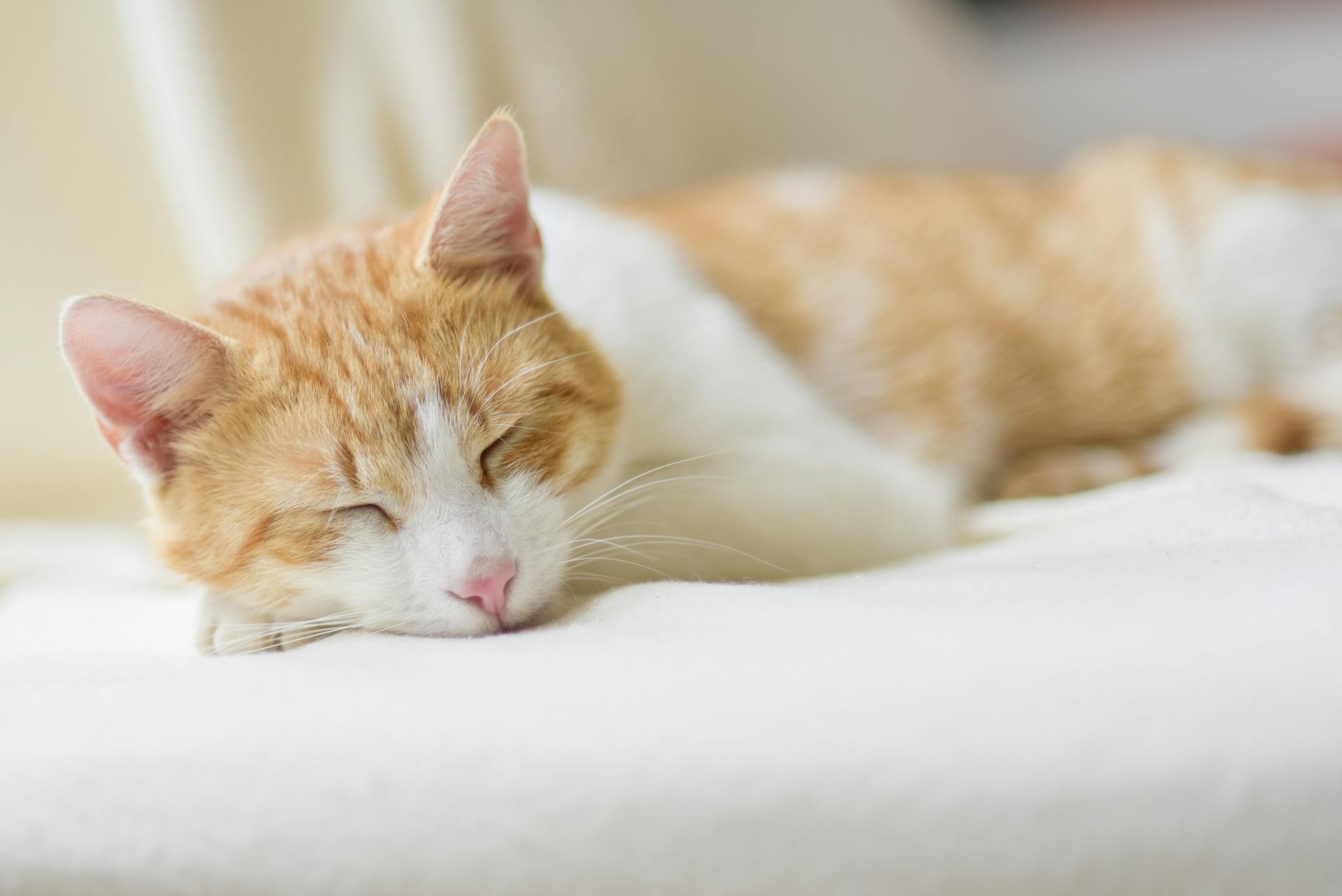
If you love your cat but don't love the smell of their breath, don't worry - you can make it better! Here are a few easy steps for improving your cat's breath and keeping it that way:
1. Feed them a healthy diet. Making sure that your cat is eating quality food and treats is the most important step to improving their breath. High-quality foods provide vitamins and minerals that help support healthy digestion and proper dental hygiene, both of which help reduce bad breath. You can also supplement their meals with crunchy treats to help scrape plaque away from the surface of teeth too!
2. Brush their teeth regularly. Just like humans, cats need regular dental care in order to keep their gums and teeth healthy. Use an enzymatic toothpaste specifically designed for cats - this type of toothpaste helps break down bacteria in the mouth without needing to rinse it off afterward (like you would with human toothpaste). Trimmed nails make brushing easier too!
3. Schedule regular visits to the vet for checkups/cleanings. Regular dental examinations by your vet can help spot any problems early on, before bacteria has time to spread throughout the body (which can lead to serious health issues). Professional cleanings are recommended every 6 months at least; more often if needed based on your cats individual needs or if they have existing problems such as gum disease or tartar build-up already present in the mouth area
Following these three simple tips is essential for reducing bad odors associated with your cat's oral care and promoting good oral hygiene practices within them! You will also be helping protect against terrible toothaches in later life as well as serious health concerns caused by poor overall dental health such as heart disease, kidney failure or liver disease among other things too so getting into a strong routine of brushing once or twice daily with some high-quality food options thrown into mix should do wonders not just for keeping them nice smelling but also safe from future long-term consequences along the way!
You might enjoy: How to Help French Bulldogs Breathe Better
What are some effective ways to improve my cat's breath odor?
If you’re noticing that your cat’s breath is less than pleasant, then it’s important to take action right away. Poor breath odor in cats could indicate more serious health concerns such as dental issues, dehydration, or infections. Improving your cat's breath odor and maintaining good oral health can help prevent future issues while also improving their overall quality of life. Here are some effective ways to help improve your cat's breath odor:
1. Brush Your Cat’s Teeth Regularly – Much like humans, daily brushing is the best way to keep plaque from building up on your kitty’s teeth and gums, which is a major cause for bad breath. Start by getting them used to having their mouth touched with small amounts of time each day before introducing a toothbrush or finger brush specifically designed for cats and using toothpaste made just for them. Once they're comfortable let you can slowly increase the brushing time until it becomes part of their daily routine!
2. Offer Healthy Treats and Chew Toys – Chewing treats like rawhide or dental sticks designed specifically for pet use can help remove plaque and bacteria build-up on the surface of teeth while providing stimulation that helps prevent boredom which often leads to other behavioral problems like chewing furniture! Be sure to only offer well-made treats that are appropriate for cats since many dog products contain ingredients that should never be consumed by our feline companions.
3 Provide Plenty Of Fresh Water – Keeping your kitty hydrated not only helps make bad breath better but also has many other benefits like promoting regular digestion, lubricating joints & muscles, regulating body temperature during exercise /play sessions etc.. Make sure there is always available fresh water in multiple areas around the house in order ensure easy access when needed so even timid vet visitors won't hesitate about drinking when thirsty throughout the day. Additionally try sprucing up those drinking spots with some peanut butter flavored drops in water bowls or opt for water fountain options available from most pet stores!
4 Give Them An Annual Dental Exam– Even if you’re regularly brushing their teeth at home it still doesn't guarantee that all underlying issues may have gone unnoticed so giving your fur kid a routine checkup at least once annually will ensure any hidden oral & dental nasties get identified prior! This way any problems will be addressed before they become too difficult/ costly / dangerous resulting in vetoing potential further pain & suffering due huge bills piled onto already depleted budgets... Not fun!!
Following these tips should help reduce food debris build-up on their teeth as well as keep more serious conditions related to stinky mouths locked away outa sight!!
Intriguing read: How to Make a Cat's Breath Smell Better?
How do I get rid of my cat's bad breath?
Getting rid of your cat's bad breath may seem like a daunting and impossible task, but it doesn't have to be! The first step to take is to check for any possible dental health issues. Bad breath in cats usually indicates a problem such as tooth decay or gum disease, so you'll want to make sure your kitty has an appointment scheduled with the vet. If no dental problems are present, it could be due to diet or environmental factors causing the bad odor.
When it comes to diet, try switching your cat's food over time if they are eating something that is causing them digestive distress. Adding fiber such as canned pumpkin, ground flaxseeds or psyllium husks can also help regulate their digestive system and minimize odors in their mouth. Also watch out for foods with high amounts of carbohydrate fillers that can feed the bacteria that produces smelly waste gases--such as garlic powder and onions!
When looking at environmental factors behind bad breath, keeping your pet's litter box clean and fresh can do wonders for reducing odors coming from their mouths. Also make sure they have plenty of fresh water available at all times; dehydration doesn't only affect their health but also causes increased bacterial activity which leads to extra smelly breath. Brushing their teeth regularly with a pet-specific toothpaste can also help keep bacteria away from gums and teeth which will reduce offensive odors in turn.
Overall there are many ways you can eliminate bad odors coming from your kitty's mouth by looking into dietary changes, dental cleanings and maintaining a clean living environment for them—but regular visits at the vet should always be included when trying different methods at home too!
You might enjoy: How to Celebrate a Cat's Birthday?
What kind of food should I give my cat to help improve their breath?
If you're having trouble with your cat's breath, it may be time to look at their diet. Poor oral hygiene is one of the major causes of bad breath in cats, and an unbalanced nutritional diet can heavily contribute to the issue. To help freshen up your cat's breath and make them more comfortable, there are certain foods that you should consider feeding them.
Whole prey such as mice and/or fish give cats a natural source of protein which helps build strong muscles, bones, skin and fur - all necessary for healthy oral hygiene in cats. It's important to give small-breed adult cats several meals consisting of small pieces (or whole mice/fish) per day since they need more frequent meals than larger breed adults due to their smaller stomach capacity.
Furthermore, diets high in fiber are beneficial for managing feline dental health by providing fibrous materials that scrape away tartar deposits on teeth while chewing or even breaking down chunks into smaller pieces during digestion – which helps reduce plaque buildup over time. You can give your cat high-fiber foods such as carrots or other vegetables that are suitable for feline consumption so they get the proper nutrients without compromising taste or presentation.
Finally, adding water sources like wet food can provide some extra hydration along with Vitamin C from fruits like kiwi (with its skin removed), melon slices, citrus segments -all low in sugar content contributing positively towards overall dental hygiene. Soft moist food has easy digestibility compared to dry kibble— not requiring too much chewing—giving less opportunity for bacteria producing tartar buildup along the gums line--resulting in bad odors associated with poor mouth health..
By following these dietary guidelines tailored specifically toward improving mic’s oral hygiene through different sources of nutrition you'll hopefully be able to keep your pets breath smelling sweet again!
A unique perspective: How to Fish in Cats and Soup?
Is there a dental product that I can use to help freshen my pet's breath?
If your pet's breath isn't fresh and sweet, you may want to consider some dental products specifically designed for animals. These will help to reduce tartar buildup on your pet's teeth, decrease their risk of serious gum issues, and give their breath a pleasant smell.
One of the best dental products for pets is a toothbrush and toothpaste made specially for animals. These brushes have ergonomic handles to make it easier for you to take care of your pet’s oral hygiene needs without having to stick your finger in their mouth. Look for toothpaste that contains enzymes which break down plaque and bad bacteria, as well as natural ingredients such as aloe vera or tea tree oil which can help fight off infection-causing germs.
Another helpful product, especially if you don't have the time or energy to brush every day (or very often), are dental chews and treats that are designed with special ridges on them that can scrape away tartar while they eat them – much like when humans chew popcorn kernels! Look for chews and treats that use natural ingredients with antibacterial properties like parsley, mint or fennel oils so they're both effective at freshening up bad breath as well as safe enough to be eaten by pets.
Finally, there are liquid additives specifically designed for treating pets' bad breath which work similarly but much faster than regular brushing – just a few drops added into the drinking water can do the job! However it is still recommended that aside from using these additives from time-to-time you should also brush regularly in order to keep up good oral hygiene habits with your furry friend throughout his life span.
Intriguing read: Smell Bad
Is there a natural ingredient I can use to freshen my cat's breath?
It's not uncommon for cats to have bad breath, even with regular dental hygiene. But if you want to give your cat a bit of extra freshness, there are some natural ingredients you can use as a gentle and effective breath freshener.
One easy solution is apple cider vinegar. Simply mix one part apple cider vinegar into four parts water, and let your cat take a sip whenever their breath needs refreshing. The acidic content in the vinegar should help reduce odor-causing bacteria in their mouth, leaving them with better smelling breath for longer periods of time.
Oranges are also surprisingly effective at removing foul odors from cats' mouths. Feeding your cat slices of orange or orange juice can help break down the built-up plaque that causes bad breath and leave them with fresher-smelling air after brushing or licking it off their fur!
A more traditional option is baking soda paste. Make a paste using baking soda and warm water and rub on the sides of your kitty’s tongue until it begins to foam up (you may need an extra pair of hands). Rinse off afterward so they don't swallow any residue left behind -- this method works great for stubborn cases of bad breath due to its antibacterial properties, eliminating food particles trapped between their teeth that cause odor build-up over time.
Finally, herbs such as mint and cloves can also be used as a natural way to combat feline halitosis – simply sprinkle these herbs directly onto their dry food or treats before offering it to them every day – see what works best for your kitty{! So if you're looking for ways to naturally keep your furry friend's breathe smelling nice, give one (or all) of these options a try!
Explore further: Why Are My Cats so Staticy?
Are there any other tips or tricks I can use to make my cat's breath smell better?
Having a furry friend can bring immense joy and satisfaction to pet owners. Unfortunately, our cats can sometimes have bad breath – a problem that might be more common than you think! If you're trying to combat your cats’ bad breath odor, there are some tips and tricks you should consider.
The first piece of advice is to ensure your kitty is taking good care of their teeth. Giving them plenty of dental chews every day will help keep plaque and tartar at bay which will ultimately help give them fresher breath. Brush their teeth after brushing your own, if possible, or use special cat toothbrushes sold in pet stores to make the process easier.
You may also want to take action on their diet as this could be contributing to the issue at hand. Feeding high-quality wet food or even snacks such as fish flavored kibble could be a great way to diminish bad odors from the start! For example, feeds that include chlorophyll or parsley extract tend to reduce oral odor naturally which would be beneficial for your favorite furball!
Another option would involve bringing herbal remedies into play; many cat owners swear by these as they contain ingredients specifically designed for freshening up bad breath from within the mouth area. Look for herbs such as fennel seed oil and rosemary essential oil in particular – these have been known to increase bacteria-fighting capabilities while providing natural aromatherapies at the same time.
Ultimately, ensuring that our cats get proper dental care is key when it comes down making sure we don't face stinky breath issues with them - but if it's too late for that then try out some of these unique tips and tricks instead!
Here's an interesting read: Cats Bad Breath
Sources
- https://www.theverge.com/2022/10/19/23411972/microsoft-xbox-mobile-store-games
- https://www.ppic.org/publication/ppic-statewide-survey-californians-and-their-government-october-2022/
- https://icatcare.org/advice/elderly-cats-special-considerations/
- https://www.nytimes.com/wirecutter/money/amazon-cyber-monday-deals-2022-1128/
- https://www.eurogamer.net/playstation-userbase-significantly-larger-than-xbox-even-if-every-cod-player-ditched-sony-microsoft-says
- https://www.amazon.com/Fresh-Step-Litter-Crystals-Deodorizer/dp/B07VHKLP7M
- https://www.nytimes.com/reviews/movies
- https://www.thesprucepets.com/best-dog-toothpaste-4167606
- https://www.givenchy.com/int/en/homepage
- https://www.amazon.com/Arm-Hammer-Advanced-Toothbrush-Toothpaste/dp/B01AY52HX8
- https://allaboutcats.com/best-dental-cat-treats
- https://www.rd.com/list/dog-facts-you-didnt-know/
- https://www.wikihow.com/Eliminate-Cat-Odors-Around-the-House
- https://www.amazon.com/Petkin-Plaque-Toothwipes-Fresh-Packs/dp/B075Y1RH6Q
- https://www.telegraph.co.uk/news/
Featured Images: pexels.com


